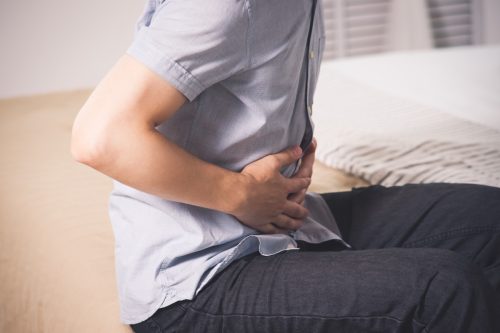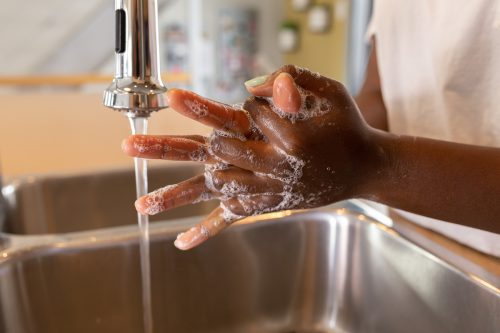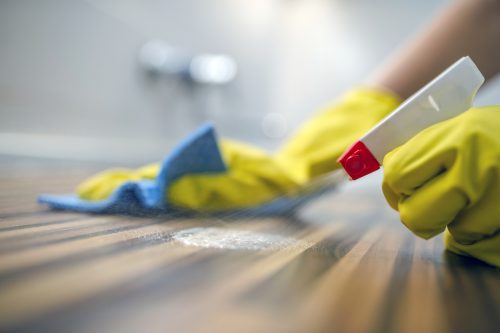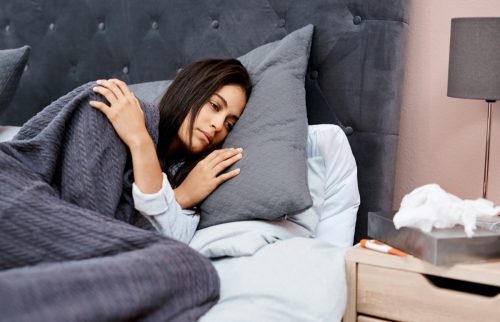Norovirus Is Spreading Rapidly—The 3 Easiest Ways to Protect Yourself

Not many things are worse than waking up in the middle of the night with a feeling that something isn’t quite right, then suddenly realizing what it is as you jump out of bed and race to the bathroom to hang your head over the toilet. We’ve all been there—and lately, many of us are experiencing it again as norovirus cases surge in the U.S.
The Centers for Disease Control and Prevention (CDC) tracks cases of this highly contagious virus, and a quick glance at their line graph illustrating the current spike in cases might be enough to make you slightly sick to your stomach, even if you’re totally healthy at the moment.
“As people are starting to gather together more frequently, it isn’t totally surprising that we are experiencing an uptick in infections,” explains Ali Alhassani, MD, the Head of Clinical at Summer Health. He and Chip Manuel, PhD, Food Safety Science Advisor at GOJO Industries, gave Best Life the lowdown on the virus and shared their top tips for staying well. Read on to find out how you can (hopefully) sidestep the “stomach flu” this season.
READ THIS NEXT: Never Leave the Bathroom Stall Before Doing This, Doctors Warn.
Norovirus isn’t actually the flu.

“Norovirus is a pesky virus that causes severe vomiting and diarrhea. In fact, it is one of the most common causes of gastroenteritis worldwide,” says Manuel. “While it is not related to influenza virus, sometimes the virus is referred to as the ‘stomach flu.'”
Alhassani notes that norovirus is “highly contagious,” and that the vomiting, diarrhea, and cramps that are hallmarks of the condition are due to “inflammation of the stomach and intestines.” He explains that while norovirus is most common between November and March, it can spread at any time of year, and is contracted primarily in three ways: “Consuming food or drinks contaminated with the virus, touching surfaces that have the virus on it and then touching your fingers to your mouth, and having direct contact with someone infected with norovirus.”
READ THIS NEXT: 90 Percent of Flu Hospitalizations Are Linked to These 4 Underlying Conditions, CDC Says.
Practicing good “hand hygiene” is essential.

Remember when we were all washing our hands 37 times a day (or more!) during the height of COVID? Manuel and Alhassani say this is no time to relax our hand-washing routine. “Norovirus cases were historically low during the first two years of the COVID-19 pandemic,” explains Manuel, who speculates that “we may be seeing increased cases due to a combination of reduced immunity, as well as people dropping their pandemic precautions.”
“The best way to protect yourself from the norovirus is to practice good hand hygiene,” Alhassani echoes.
Need a refresher on proper hand-washing practice? The CDC says we should all be washing our hands before, during, and after making food, before and after eating, after using the bathroom or changing a diaper, after taking the trash out, before and after caring for a person who is sick, after blowing our noses, and after feeding or cuddling our pets. They also say to scrub with soap and water for 20 seconds (yes, that’s the length of the “Happy Birthday” song sung through all the way twice), lather up the backs of your hands, under your nails, and between your fingers, and to rinse and dry your hands thoroughly.
Norovirus can live on surfaces for a long time.

Our hands aren’t the only things we need to keep clean in order to stay healthy. “The virus can survive on surfaces for weeks,” Manuel tells Best Life. That means if you or a person who lives with you contracts norovirus, you’ll need to be extra rigorous about cleaning for a good long while, even after they’ve recovered.
“If someone in your household is infected, it’s important to disinfect shared surfaces that could be contaminated with the virus in order to prevent it from spreading further,” says Alhassani.
For more health news sent directly to your inbox, sign up for our daily newsletter.
Isolating sick people can help stop the spread.

While it may be tempting to console your sick loved one with a snuggle, or at least a tender pat on the head, Alhassani and Manuel both say you’re better off keeping your distance. “The infectious dose is extremely low, and the virus spreads incredibly fast,” warns Manuel. He explains that places where people gather, such as “schools, long-term care facilities, and restaurants are particularly at risk for outbreaks.”
“Practicing good hand hygiene, regularly cleaning and disinfecting surfaces, and keeping sick people away from one another are all best practices for reducing the risk of norovirus,” he reiterates, noting that “we have seen a relaxation of these practices in recent months, perhaps due to ‘pandemic fatigue.'”